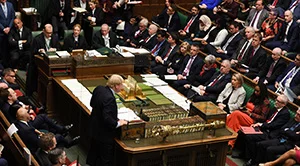 Although it has been among the most heavily regulated sectors not only in the UK but also on a global scale, the country’s gambling laws have proven that they were unsuitable to regulate the sector that has profited from addiction for years. The Government has promised to make multiple revolutionary changes to clean up the industry but some anti-gambling campaigners have shared their concerns that would be easier said than done because some politicians have been the ones who have been working in favour of the gambling sector for a long time.
Although it has been among the most heavily regulated sectors not only in the UK but also on a global scale, the country’s gambling laws have proven that they were unsuitable to regulate the sector that has profited from addiction for years. The Government has promised to make multiple revolutionary changes to clean up the industry but some anti-gambling campaigners have shared their concerns that would be easier said than done because some politicians have been the ones who have been working in favour of the gambling sector for a long time.
According to the local charity organisation Gambling with Lives, there are over 400 suicides associated with problem gambling in the UK on an annual basis, with 1.4 million British residents currently being categorised as gambling addicts. For years, anti-gambling campaigners have been warning that the situation is getting worse, with the actual number of gambling addicts being a lot bigger.
As Casino Guardian reported recently, the White Paper on gambling that was published by the UK Government at the end of April proposed a set of changes, including the implementation of a statutory levy that would force gambling companies to contribute additional funds for research, education, prevention and treatment of gambling and gambling-related harm. The implementation of obligatory affordability checks for customers of online gambling platforms and the introduction of stake limits on online slots have also been among the major changes unveiled by the Government aimed at updating the Gambling Act 2005.
Anti-gambling campaigners and charities have welcomed the proposed changes, saying they were a major step forward, but some, like the ex-problem gambler and current director of the Clean Up Gambling group Mark Zarb-Cousin, shared they were willing to see more from the trade body representing the legal gambling sector – the Betting and Gaming Council (BGC).
MPs Lobbying in Favour of the UK Gambling Sector for Years, Investigation Unveils
 A representative of the Betting and Gaming Council has noted that the companies represented by the organisation currently support about 110,000 high-street betting shop jobs across the country, including jobs in tourism and hospitality via bingo and casino services, and a constantly growing number of technology jobs in the online gambling sector, as well. And although the body welcomed the planned industry overhaul and the proposed changes, it has warned that too many restrictions could have an extremely negative impact on the sector, forcing consumers to turn to illegal and unregulated gambling services offered in the black market.
A representative of the Betting and Gaming Council has noted that the companies represented by the organisation currently support about 110,000 high-street betting shop jobs across the country, including jobs in tourism and hospitality via bingo and casino services, and a constantly growing number of technology jobs in the online gambling sector, as well. And although the body welcomed the planned industry overhaul and the proposed changes, it has warned that too many restrictions could have an extremely negative impact on the sector, forcing consumers to turn to illegal and unregulated gambling services offered in the black market.
On the other hand, the trade body representing the legal gambling industry in the UK claims that the number of people who have faced the negative consequences of gambling is decreasing, with gambling addiction rates among British adults falling to 0.2%.
The National Health Service (NHS) is still engaged in the treatment of a record number of people who are categorised as problem gamblers. In 2022 it reported a 50% increase in referrals in comparison to the year before.
Now, gambling critics are expected to have a major fight not only with the sector but with its multiple lobbyists in the Parliament.
Only recently, Member of Parliament Scott Benton has been suspended after an undercover investigation by The Times found him to have proposed to lobby in favour of the industry by defending its interests.
According to reports, licensed gambling companies, in their turn, have boosted the amount they spend on political campaigns of both the Conservative and Labour Members of Parliament tenfold in only five years. Under the existing rules, MPs are currently required to disclose any hospitality estimated to be at least £300. Many of them, however, have found a way to circumvent the rules, with tickets for different races or events worth £295.
- Author


